S.R. Piccoli's Blog, page 10
October 11, 2016
The Sacking of the West
 ‘Saint Augustine writing’; illumination from Augustine’s City of God, 1459
‘Saint Augustine writing’; illumination from Augustine’s City of God, 1459Bibliothèque Sainte-Geneviève, Paris
Sometimes we’re tempted to despair, also—but not only—because of the cowardice and hypocrisy of those who should be supposed to fight for what they say they believe in. But we simply cannot give in to this temptation, because, as St. Augustine reminds us, the City of Man will fall and be rebuilt, but the City of God is unshakable.
In The City of God—the writing of which had as its immediate historical context the sacking of Rome by Alaric in 410—he writes that “Rome, which was founded and increased by the labors of these ancient heroes, was more shamefully ruined by their descendants while its walls were still standing, than it is now by the razing of them.”
Yes, Rome fell internally before it fell externally. It was ravaged by an interior cancer—an internal rot of the moral kind—which left it hollow and brittle.
As the Author of this excellent Crisis Magazine article puts it,
As we look around at these uncertain times, and ask how it came to choosing between these two candidates, it might appear, that the world is falling to pieces. It is not. The West might be, just as Rome did, but the world is God’s and God will not forsake it.COPYRIGHT NOTICE:
If, like me, you are tempted to accept all as futile, let us remember the words of Augustine in his preface.
“But God is my helper. For I am aware what ability is requisite to persuade the proud how great is the virtue of humility.”
The City of God will prevail, and God is our helper.
All original content of this blog [Wind Rose Hotel] is subject to
Creative Commons license (by-nc-sa)













Published on October 11, 2016 15:37
September 21, 2016
America the Beautiful
 Great Smoky Mountains National Park - Tennessee
Great Smoky Mountains National Park - Tennessee To some degree, this is what could be defined as a blog-post on demand, in fact it originates from a request by a good friend of mine, who asked me about a decent Italian translation of “America the Beautiful,” the classic patriotic song that many Americans regard as a second national anthem. After a quick search on Google I realized that there is essentially nothing at all—except a few really awful automatically generated translations (or supposedly such). So I decided to translate it myself (look at the bottom of this post). But at the same time I thought that it would be great to seize the opportunity to get deeper into the subject. Which I enthusiastically did—by exploring the genealogy of “America the Beautiful,” its context, meaning and inner beauty—because I’ve always loved that song. So this post is the result of such an effort. And my humble tribute to such a magnificent example of poetic and musical talent, as well as, of course, of American patriotism.
In the beginning there was a poem.
 Katharine Lee BatesIn the summer of 1893 a Massachusetts professor of English at Wellesley College, Katharine Lee Bates was giving a series of lectures on English literature at Colorado College, in Colorado Springs. The writing of “America the Beautiful” was the result of that trip. “One day,” she recalled in her diary, “some of the other teachers and I decided to go on a trip to 14,000-foot Pikes Peak. We hired a prairie wagon. Near the top we had to leave the wagon and go the rest of the way on mules. I was very tired. But when I saw the view, I felt great joy. All the wonder of America seemed displayed there.” It was “the most glorious scenery I ever beheld, and I had seen the Alps and the Pyrenees,” she wrote. “My memory of that supreme day of our Colorado sojourn is fairly distinct even across the stretch of 35 crowded years,” she wrote a year before her death in 1929. “We stood at last on that Gate-of-Heaven summit, hallowed by the worship of perished races, and gazed in wordless rapture over the far expanse.” “It was then and there,” she recalled, “as I was looking out over the sea-like expanse of fertile country spreading away so far under those ample skies, that the opening lines of the hymn floated into my mind”:
Katharine Lee BatesIn the summer of 1893 a Massachusetts professor of English at Wellesley College, Katharine Lee Bates was giving a series of lectures on English literature at Colorado College, in Colorado Springs. The writing of “America the Beautiful” was the result of that trip. “One day,” she recalled in her diary, “some of the other teachers and I decided to go on a trip to 14,000-foot Pikes Peak. We hired a prairie wagon. Near the top we had to leave the wagon and go the rest of the way on mules. I was very tired. But when I saw the view, I felt great joy. All the wonder of America seemed displayed there.” It was “the most glorious scenery I ever beheld, and I had seen the Alps and the Pyrenees,” she wrote. “My memory of that supreme day of our Colorado sojourn is fairly distinct even across the stretch of 35 crowded years,” she wrote a year before her death in 1929. “We stood at last on that Gate-of-Heaven summit, hallowed by the worship of perished races, and gazed in wordless rapture over the far expanse.” “It was then and there,” she recalled, “as I was looking out over the sea-like expanse of fertile country spreading away so far under those ample skies, that the opening lines of the hymn floated into my mind”:Oh beautiful for spacious skies
For amber waves of grain
For purple mountain majesties
Above the fruited plain!
Yet, “America the Beautiful” is not just a nostalgic evocation of a pastoral landscape. It’s also a tribute to the faithful courage and tenacity of the Pilgrims, who first tamed the wilderness,
Oh beautiful for pilgrim feet
Whose stern, impassioned stress
A thoroughfare for freedom beat
Across the wilderness!
and to the heroes who fought for freedom
O beautiful for heroes proved
In liberating strife.
Who more than self their country loved
And mercy more than life!
In a letter to friends, Bates also rebuked her fellow countrymen/women by observing that “countries such as England failed because, while they may have been great,” they had not been good. That's why, “unless we are willing to crown our greatness with goodness, and our bounty with brotherhood, our beloved America may go the same way”...
America! America!
May God thy gold refine
Till all success be nobleness
And every gain divine!
The poem is also a hymn to the “dream” which is America herself, to the nation’s potential—including the gleaming modernity of its “alabaster cities” :
O beautiful for patriot dream
That sees beyond the years
Thine alabaster cities gleam
Undimmed by human tears!
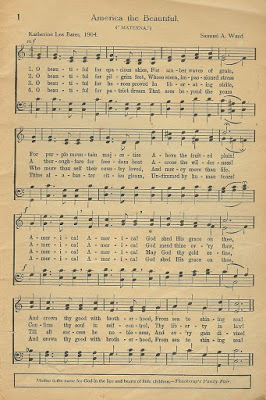 “America the Beautiful” was published in three revised versions: the first on July 4, 1895, in a weekly church publication in Boston called The Congregationalist, the second on November 19, 1904, in the Boston Evening Transcript, and third and final one in her book America the Beautiful and Other Poems (1911).
“America the Beautiful” was published in three revised versions: the first on July 4, 1895, in a weekly church publication in Boston called The Congregationalist, the second on November 19, 1904, in the Boston Evening Transcript, and third and final one in her book America the Beautiful and Other Poems (1911). The poem became quickly popular. “No one was more amazed than I at the way the hymn was taken up,” the poetess once explained. “When I found that you really wanted to sing it, I rewrote it in some respects to make it a bit more musical.” The poem was sung to many different tunes for years—many simply started singing the words in the tune of a folk song, such as “Auld Lang Syne”—until, finally, it followed the melody of Samuel Augustus Ward’s “Materna,” which became the standard melody still used today. So “America the beautiful” became the great patriotic anthem that we all know and love :
America! America!
God shed His grace on thee
And crown thy good with brotherhood
From sea to shining sea!
Over the years, the song has been recorded by such artists as Frank Sinatra, Ray Charles, Elvis Presley and Willie Nelson.
Since the very beginning of it all, many citizens have lobbied Congress to make the song the national anthem of the United States of America. On July 4, 1993, an “America the Beautiful” plaque was installed on the top of Pike’s Peak to commemorate the 100th anniversary of the poem.
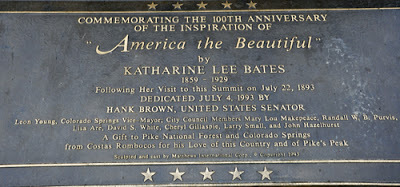 The plaque commemorating the 100th anniversary of "America the Beautiful"
The plaque commemorating the 100th anniversary of "America the Beautiful"AMERICA THE BEAUTIFUL
- ITALIAN VERSION -
O bella, per i cieli spaziosi
Per le onde ambrate di grano
Per la maestà di montagne color porpora
Sopra la pianura fruttuosa!
America! America!
Dio ha sparso la sua grazia su di te
E corona il tuo bene con la fratellanza
Da mare a mare splendente!
O bella per i piedi dei pellegrini
Il cui severo e appassionato sforzo
Ha tracciato una strada di libertà
Attraverso deserti e terre selvagge!
America! America!
Dio ripara ogni tuo difetto,
Rafforza la tua anima nell’autocontrollo
E la tua libertà nella legge!
O bella per gli eroi che hanno mostrato
Il proprio coraggio
Nella lotta per la libertà.
Che hanno amato il proprio Paese
Più di sé stessi
E la misericordia più della vita!
America! America!
Possa Dio raffinare il tuo oro
Fino a rendere nobile il successo
E divino ogni guadagno!
O bella per il sogno dei patrioti
Che vede al di là degli anni
Brillare le tue città di alabastro
Non offuscate da lacrime umane!
America! America!
Dio ha sparso la sua grazia su di te
E corona il tuo bene con la fratellanza
Da mare a mare splendente!
ORIGINAL TEXT
O beautiful for spacious skies,
For amber waves of grain,
For purple mountain majesties
Above the fruited plain!
America! America!
God shed his grace on thee
And crown thy good with brotherhood
From sea to shining sea!
O beautiful for pilgrim feet
Whose stern impassioned stress
A thoroughfare of freedom beat
Across the wilderness!
America! America!
God mend thine every flaw,
Confirm thy soul in self-control,
Thy liberty in law!
O beautiful for heroes proved
In liberating strife.
Who more than self their country loved
And mercy more than life!
America! America!
May God thy gold refine
Till all success be nobleness
And every gain divine!
O beautiful for patriot dream
That sees beyond the years
Thine alabaster cities gleam
Undimmed by human tears!
America! America!
God shed his grace on thee
And crown thy good with brotherhood
From sea to shining sea!
COPYRIGHT NOTICE:
All original content of this blog [Wind Rose Hotel] is subject to
Creative Commons license (by-nc-sa)













Published on September 21, 2016 06:43
September 16, 2016
Love Letter

 Happy Birthday Princess,
Happy Birthday Princess,We get old and get use to each other. We think alike.
We read each others minds. We know what the other wants without asking. Sometimes we irritate each other a little bit. Maybe sometimes take each other for granted.
But once in awhile, like today, I meditate on it and realize how lucky I am to share my life with the greatest woman I ever met. You still fascinate and inspire me.
You influence me for the better. You’re the object of my desire, the #1 Earthly reason for my existence. I love you very much.
Happy Birthday Princess.
John
~ Johnny Cash, Birthday letter to his wife, June Carter Cash, 1994

Country music legend Johnny Cash wrote the above quoted love letter in 1994, on June’s 65th birthday, while he was in Odense, Denmark. Voted the greatest love letter of all time by the readers of the Daily Mail in the U.K.—topping romantic missives from, among others, British Prime Minister Winston Churchill to his wife, poet John Keats to his next door neighbor, musician Jimi Hendrix to a mystery woman, and actor Richard Burton to Elizabeth Taylor—the letter proved once and for all that The Man in Black was not only a talented performer and songwriter but also a man of deep feelings and extraordinary sensitivity. The pair married in 1968 and remained together for more than 30 years. June died in May 2003. Johnny passed away just four months later. As many know, the sometimes tempestuous, but always profound and genuine love story between Johnny and his wife has been chronicled extensively in the movie Walk the Line—a pretty good one, not a masterpiece, though.

To conclude here is a video that illustrates—perhaps in the best possible way—what true love is all about. It is a bit sad, I know, or that's how it might seem at first glance, but this is part of the mystery which is Love itself.
COPYRIGHT NOTICE:
All original content of this blog [Wind Rose Hotel] is subject to
Creative Commons license (by-nc-sa)













Published on September 16, 2016 16:15
August 22, 2016
Magnificat
What are your favorite New Testament passages? One of mine is Luke 1:46-55 (The Magnificat). These verses are one of the Marian texts par excellence and one of the most notable prayers in all of Scripture. I’ve always loved them, but the more the time goes by the more I find myself in love with the meaning and even the sound—especially, I must say, in Italian, my mother tongue—of such wonderful and inspiring words. Here is the text in English and Italian.
 The Visitation by Lorenzo Monaco (1409 ca)
The Visitation by Lorenzo Monaco (1409 ca)
The Courtauld Institute of Art - London
 My soul doth magnify the Lord,
My soul doth magnify the Lord,
And my spirit hath rejoiced in God my Saviour.
For he hath regarded
the low estate of his handmaiden:
for, behold, from henceforth
all generations shall call me blessed.
For he that is mighty hath done to me great things;
and holy is his name.
And his mercy is on them that fear him
from generation to generation.
He hath shewed strength with his arm;
he hath scattered the proud in the imagination of their hearts.
He hath put down the mighty from their seats,
and exalted them of low degree.
He hath filled the hungry with good things;
and the rich he hath sent empty away.
He hath helped his servant Israel,
in remembrance of his mercy;
As he spake to our fathers,
to Abraham, and to his seed for ever.
(King James Version)
ITALIAN
 L'anima mia magnifica il Signore
L'anima mia magnifica il Signore
e il mio spirito esulta in Dio, mio salvatore,
perché ha guardato l'umiltà della sua serva.
D'ora in poi tutte le generazioni mi chiameranno beata.
Grandi cose ha fatto in me l'Onnipotente
e Santo è il suo nome:
di generazione in generazione la sua misericordia
si stende su quelli che lo temono.
Ha spiegato la potenza del suo braccio,
ha disperso i superbi nei pensieri del loro cuore;
ha rovesciato i potenti dai troni,
ha innalzato gli umili;
ha ricolmato di beni gli affamati,
ha rimandato a mani vuote i ricchi.
Ha soccorso Israele, suo servo,
ricordandosi della sua misericordia,
come aveva promesso ai nostri padri,
ad Abramo e alla sua discendenza, per sempre.
(Versione Ufficiale C.E.I.)
Johann Sebastian Bach's Magnificat, in turn, is one of the most magnificent works in the whole choral repertory—and one of my favorite music pieces ever!
Magnificat in D major, BWV 243
Arnold Schoenberg Choir
Concentus Musicus Wien
Nikolaus Harnoncourt, conductor:
COPYRIGHT NOTICE:
All original content of this blog [Wind Rose Hotel] is subject to
Creative Commons license (by-nc-sa)













 The Visitation by Lorenzo Monaco (1409 ca)
The Visitation by Lorenzo Monaco (1409 ca)The Courtauld Institute of Art - London
 My soul doth magnify the Lord,
My soul doth magnify the Lord, And my spirit hath rejoiced in God my Saviour.
For he hath regarded
the low estate of his handmaiden:
for, behold, from henceforth
all generations shall call me blessed.
For he that is mighty hath done to me great things;
and holy is his name.
And his mercy is on them that fear him
from generation to generation.
He hath shewed strength with his arm;
he hath scattered the proud in the imagination of their hearts.
He hath put down the mighty from their seats,
and exalted them of low degree.
He hath filled the hungry with good things;
and the rich he hath sent empty away.
He hath helped his servant Israel,
in remembrance of his mercy;
As he spake to our fathers,
to Abraham, and to his seed for ever.
(King James Version)
ITALIAN
 L'anima mia magnifica il Signore
L'anima mia magnifica il Signore e il mio spirito esulta in Dio, mio salvatore,
perché ha guardato l'umiltà della sua serva.
D'ora in poi tutte le generazioni mi chiameranno beata.
Grandi cose ha fatto in me l'Onnipotente
e Santo è il suo nome:
di generazione in generazione la sua misericordia
si stende su quelli che lo temono.
Ha spiegato la potenza del suo braccio,
ha disperso i superbi nei pensieri del loro cuore;
ha rovesciato i potenti dai troni,
ha innalzato gli umili;
ha ricolmato di beni gli affamati,
ha rimandato a mani vuote i ricchi.
Ha soccorso Israele, suo servo,
ricordandosi della sua misericordia,
come aveva promesso ai nostri padri,
ad Abramo e alla sua discendenza, per sempre.
(Versione Ufficiale C.E.I.)
Johann Sebastian Bach's Magnificat, in turn, is one of the most magnificent works in the whole choral repertory—and one of my favorite music pieces ever!
Magnificat in D major, BWV 243
Arnold Schoenberg Choir
Concentus Musicus Wien
Nikolaus Harnoncourt, conductor:
COPYRIGHT NOTICE:
All original content of this blog [Wind Rose Hotel] is subject to
Creative Commons license (by-nc-sa)













Published on August 22, 2016 05:05
June 7, 2016
Western Identity

 It is because of America, its success, its conflicts, and its symbolic importance in the world, that the question raised by Spengler is still with us: the question of Western identity. Take away America, its freedom, its optimism, its institutions, its Judeo-Christian beliefs, and its educational tradition, and little would remain of the West, besides the geriatric routines of a now toothless Europe.
It is because of America, its success, its conflicts, and its symbolic importance in the world, that the question raised by Spengler is still with us: the question of Western identity. Take away America, its freedom, its optimism, its institutions, its Judeo-Christian beliefs, and its educational tradition, and little would remain of the West, besides the geriatric routines of a now toothless Europe. ~ Roger Scruton, Culture Counts: Faith and Feeling in a World Besieged.

Taking part in a radio debate and discussing how America has retreated as a world leader, English philosopher and writer Roger Scruton recently said, “It’s certain that President Obama will not be seen as a strong president.” Then, as a man with a foreigner’s perspective, he added, “What are we, the rest of the world, to do without American leadership?”
The above quoted excerpt from his preface to Culture Counts: Faith and Feeling in a World Besieged might be of some help in explaining his concerns about the future of the world.COPYRIGHT NOTICE:
All original content of this blog [Wind Rose Hotel] is subject to
Creative Commons license (by-nc-sa)













Published on June 07, 2016 09:30
June 5, 2016
My Books & the Historic Athenaeum Fund of Ca' Foscari University of Venice
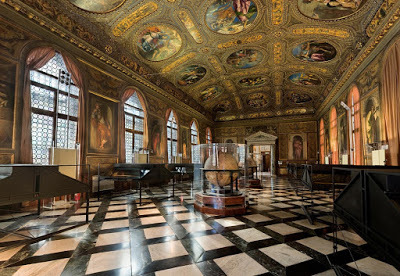 Biblioteca Nazionale Marciana, Venice. Sansovinian HallI am pleased to inform the readers—especially those living or visiting the Venice area—that starting from June 2016 my books have been catalogued and incorporated into the collections of the Fondo Storico di Ateneo (Historic Athenaeum Fund) of Ca’ Foscari University of Venice—which is part of the Italian National Library Service (SBN) promoted by the Italian Ministry for Cultural Heritage and locally managed by the Biblioteca Nazionale Marciana. The books are available for consultation by scholars and students.
Biblioteca Nazionale Marciana, Venice. Sansovinian HallI am pleased to inform the readers—especially those living or visiting the Venice area—that starting from June 2016 my books have been catalogued and incorporated into the collections of the Fondo Storico di Ateneo (Historic Athenaeum Fund) of Ca’ Foscari University of Venice—which is part of the Italian National Library Service (SBN) promoted by the Italian Ministry for Cultural Heritage and locally managed by the Biblioteca Nazionale Marciana. The books are available for consultation by scholars and students.Here are the direct links to the books:
Breviario del giovane politicoBlessed Are the Contrarians : Diary of a Journey Through Interesting TimesBeing Conservative from A to Z : An Anthology and Guide for Busy Conservative-Minded PeopleCOPYRIGHT NOTICE:
All original content of this blog [Wind Rose Hotel] is subject to
Creative Commons license (by-nc-sa)













Published on June 05, 2016 08:03
May 16, 2016
Mr. Trump Goes to Washington

After Trump and the Rise of the Unprotected and Simple Patriotism Trumps Ideology, yet another must read by Peggy Noonan, the great speech writer for Ronald Reagan and now a columnist for The Wall Street Journal: Mr. Trump Goes to Washington. Here are a couple of excerpts:
But almost every conservative and Republican in Washington—in politics, think tanks and journalism—backed a candidate other than Mr. Trump. Every one of those candidates lost, and Mr. Trump won. After November, think tanks and journals will begin holding symposia in which smart people explain How We Lost The Base.By the way, I'm currently reading—with great pleasure!—Peggy Noonan's new book, The Time of Our Lives (hence the picture at the top of this post). Needless to say, strongly recommended! Here is a great review by Dana Perino.COPYRIGHT NOTICE:
Mr. Trump’s victory was an endorsement of Mr. Trump but also a rebuke to professional Republicans in Washington. It was a rebuke to comprehensive immigration plans that somehow, mysteriously, are never quite intended to stop illegal immigration; a rebuke to the kind of thinking that goes, “I know, we’ll pass laws that leave Americans without work, which means they’ll be deprived of the financial and spiritual benefits of honest labor, then we’ll cut their entitlements, because if we don’t our country will go broke.” The voters backed Mr. Trump’s stands on these issues and more.
A political question for November: Does Mr. Trump pick up more Democrats than he loses Republicans? Is that how he plans to win? Does he draw in enough new or non-Republican voters to make up for the millions of Republican voters he will surely lose?
In an act of determined denial, Washington Republicans and conservatives continue to see and describe Mr. Trump’s nomination as the triumph of a celebrity in a culture that worships celebrity, the victory of a vulgarian in a vulgar age, the living excrescence of our shallow values and lowered standards. Also, he’s tapped into the public’s rage.
He is all of those things. But he is more, and Washington is determined to ignore the more. He understood, either intuitively or after study, that the Republican base was changing or open to change, and would expand if the party changed some policies. He declared those policies changed. And he won.
As to the matter of rage, it’s more like disrespect for those who’ve been calling the shots. If you know Trump people in real life as opposed to through social media, if they are your friends and family members, you understand that “rage” doesn’t do them justice. They dislike the Republican Party, which they believe has consistently betrayed them, but Trump people in person are just about the only cheerful people in politics this year. They actually have hope—the system needs a hard electric shock, he’s just the man to do it, and if it doesn’t work they’ll fire him.
[...]
Those who oppose Mr. Trump should do it seriously and with respect for his supporters. If he is not conservative, make your case and explain what conservatism is. No one at this point needs your snotty potshots or your supposedly withering one-liners. I confess I have lost patience with many of those declaring they cannot in good conscience support him, not because reasons of conscience are not crucial—they are, and if they apply they should be declared. But some making these declarations managed in good conscience, indeed with the highest degree of self-regard, to back the immigration proposals of George W. Bush that contributed so much to the crisis that produced Mr. Trump. They invented Sarah Palin. They managed to support the global attitudes and structures that left the working class jobless. They dreamed up the Iraq war.
Sometimes I think their consciences are really not so delicate.
As for the political consultants who insult Mr. Trump so vigorously, they are the ones who did most to invent him. What do they ever do in good conscience?
All original content of this blog [Wind Rose Hotel] is subject to
Creative Commons license (by-nc-sa)













Published on May 16, 2016 15:30
May 12, 2016
Political Correctness As 'War By Other Means'
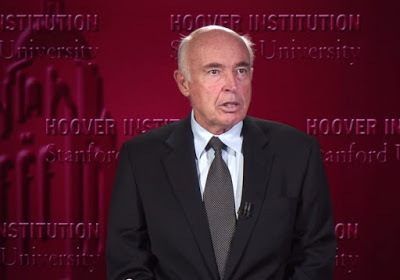
Angelo Codevilla in The Federalist (definitely a must read):
Led by Barack Obama’s Democrats, echoed by the media, backed by big corporations’ muscle, and trailed by Republicans with tail tucked between legs, our rulers demand no less than the paradigm of totalitarianism in George Orwell’s novel, “1984.”Read the rest.
Recall that Big Brother’s agent berated the hapless Winston for preferring his own views to society’s dictates, then finished breaking his spirit by holding up four fingers and demanding that Winston acknowledge seeing five. Our rulers, like Big Brother, hector us to accept their rewritten history and to superimpose their scales of value on ours. [...]
Our Progressive ruling class’s war on our scale of values climaxed in 2016 with a campaign in favor of “transgender rights”: a demand that Americans accept that someone with a penis can be a “woman” while another with a vagina can be a “man.” Object to that mandate to take leave of your senses, insist that sex-specific public bathrooms be used exclusively by persons with the requisite personal plumbing, and be expelled from polite society. Next to this, Big Brother’s demand to call four fingers five is small, mild stuff.

Angelo M. Codevilla is a fellow of the Claremont Institute, Professor Emeritus of International Relations at Boston University and the author of To Make And Keep Peace: Among Ourselves and with All Nations, Hoover Institution Press, 2014 (click here for a review by David P. Goldman in The Federalist). He served in the US Navy, the US Foreign Service, and on the US Senate Select Committee on Intelligence.
Also very interesting by Angelo M. Codevilla: "America’s Ruling Class — and the Perils of Revolution," published in The American Spectator in 2010. Codevilla enlarged this article into a small book, The Ruling Class: How They Corrupted America and What We Can Do About It. COPYRIGHT NOTICE:
All original content of this blog [Wind Rose Hotel] is subject to
Creative Commons license (by-nc-sa)













Published on May 12, 2016 02:41
May 11, 2016
The Silent Life
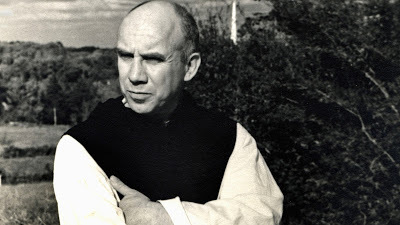
 Not all men are called to be hermits, but all men need enough silence and solitude in their lives to enable the deep inner voice of their own true self to be heard at least occasionally. When that inner voice is not heard, when man cannot attain to the spiritual peace that comes from being perfectly at one with his own true self, his life is always miserable and exhausting.
Not all men are called to be hermits, but all men need enough silence and solitude in their lives to enable the deep inner voice of their own true self to be heard at least occasionally. When that inner voice is not heard, when man cannot attain to the spiritual peace that comes from being perfectly at one with his own true self, his life is always miserable and exhausting. ~ Thomas Merton, The Silent Life.

Thomas Merton, or Father Louis by his monastic name, knew that only the true contemplative experience teaches the discipline of silence, which needs to exclude any noises and unnecessary chats, because they would profane those spaces of silence. But all true wise men—as a Camaldolese monk, Father Franco, once told me—speak few words and their words are often “silence” at the same time. Their words spring from a deep meditation. True silence keeps us away from narrow mindness. The word is a great thing, but it is not what is greatest: if word is silver, as the old proverb goes, silence is gold. Hi who aims at the higher levels of spiritual life needs silence as much as he needs his daily bread and rest for his body.COPYRIGHT NOTICE:
All original content of this blog [Wind Rose Hotel] is subject to
Creative Commons license (by-nc-sa)













Published on May 11, 2016 16:36
April 4, 2016
The Best Laws Cannot Make a Constitution Work in Spite of Morals

 The best laws cannot make a constitution work in spite of morals; morals can turn the worst laws to advantage. That is a commonplace truth, but one to which my studies are always bringing me back. It is the central point in my conception. I see it at the end of all my reflections.
The best laws cannot make a constitution work in spite of morals; morals can turn the worst laws to advantage. That is a commonplace truth, but one to which my studies are always bringing me back. It is the central point in my conception. I see it at the end of all my reflections. ~ Alexis de Tocqueville, De la supériorité des mœurs sur les lois.

The above is not only a truth. It is a truth we should take to heart—especially in this day and age when we tend to put more emphasis and value on other factors, such as social and economic ones—and a truth we should never forget. COPYRIGHT NOTICE:
All original content of this blog [Wind Rose Hotel] is subject to
Creative Commons license (by-nc-sa)













Published on April 04, 2016 14:46



